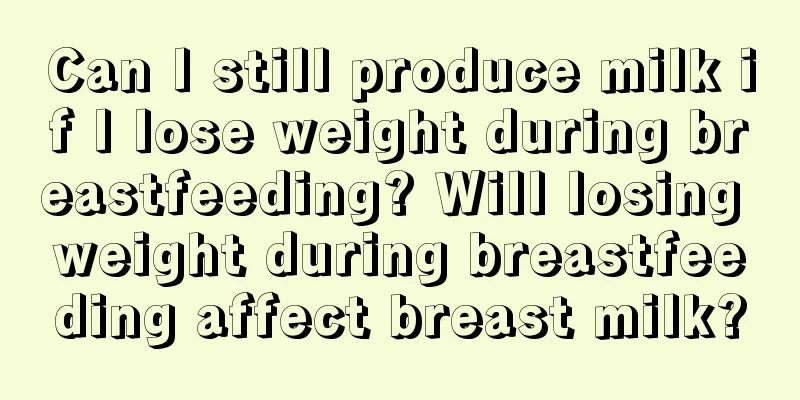What to do if your baby doesn't eat milk powder? Teach you how to solve it easily

|
Many new parents are very distressed. After weaning, their children don’t want to drink milk powder and no matter how they are coaxed, their children won’t drink milk powder. Parents are worried and their children suffer. They have no experience and don’t know what to do. So how do you solve the problem of baby not wanting to eat milk powder? I will teach you a few tricks to help you get through the weaning period smoothly. What to do if your baby refuses to eat milk powder1. Let the baby get used to bottle feeding first. Generally speaking, after mothers who breastfeed with their mothers stop breastfeeding, their babies are more likely to accept formula powder because they have already adapted to bottle feeding. Mothers who exclusively breastfeed can learn from this and try to squeeze breast milk into a bottle before weaning to let the baby get used to it for a while. In this way, when you replace the breast milk in the bottle with formula powder, the baby may be more likely to accept it. 2. Finding the right pacifier is very important. After weaning off breast milk, many babies refuse to drink formula milk, often because they cannot accept the hard and cold artificial pacifier. To avoid this situation, mothers must choose the right pacifier for their babies. There are many breastfeeding pacifiers on the market. The color, texture and size are closer to the mother's breast than ordinary pacifiers, but the price is slightly more expensive. Mothers who have the conditions can also choose this type for their babies. 3. Choose the right time to wean. Weaning is not something that adults can do on a whim. You need to choose the right time. If the baby is sick, teething, changing nannies, moving, traveling, or the mother is going on a business trip, it is best not to wean the baby first, otherwise it will increase the baby's anxiety and make it more difficult to wean. 4. Let the baby accept food other than breast milk. After adding complementary food, the baby will adapt better to food other than breast milk, and at this time he will be more receptive to formula powder. Therefore, breastfeeding mothers should gradually add complementary food after the baby is 6 months old, so that the baby can eat nutritious, soft and easy to digest food. In addition, the addition of complementary food should be diversified to let the baby adapt to the taste of different foods, which is also more conducive to the baby to adapt to formula powder faster. Why should we drink milk powder after weaning?Some mothers may ask, why should we add infant formula to our babies after weaning off breast milk? Because the nutrition that babies take in after weaning comes entirely from complementary foods, and because babies have not grown many teeth, complementary foods are mostly semi-liquid foods and are not rich in variety. Babies need a lot of nutrients such as protein, fat, vitamins, etc. for growth and development. Infant formula milk powder supplements nutrition for babies according to the characteristics of children's growth and development at different stages. Can I use fresh milk instead of milk powder?Some parents now give their children fresh milk every day after they are weaned or can eat. It is best not to drink fresh milk for children under 2 years old. Because the gastrointestinal tract, kidneys and other systems of infants and young children are not yet mature, feeding children with fresh milk will cause certain harm. First, some nutrients in fresh milk are not easily absorbed. For example, the high phosphorus content in fresh milk will affect the absorption of calcium, and the high casein content will easily coagulate into lumps when encountering stomach acid and is not easily absorbed by the gastrointestinal tract. Second, the lactose in fresh milk is mainly α-lactose, which inhibits bifidobacteria and promotes the formation of Escherichia coli, which can easily induce gastrointestinal diseases in infants. At the same time, the minerals in fresh milk will increase the burden on the kidneys, causing children to have symptoms such as chronic dehydration, dry stools, and internal heat. Third, the fat in fresh milk is mainly animal saturated fat, which will irritate the baby's delicate intestines, causing chronic hidden blood loss in the intestines and causing anemia and other diseases. What can't be eaten with milk powder?1. Milk powder cannot be eaten with rice flour In the past, this phenomenon was more common among the elderly who were taking care of children, and some even fed their babies rice flour at 2 months old. This situation is not common now. After all, most grandparents have entered a new era and have begun to pay attention to scientific parenting knowledge. However, many parents still wonder whether rice flour can be mixed with milk powder. Reminder to parents: Even if the rice flour you bought clearly states that it can be mixed with milk powder, even if you only add rice flour to 1-2 meals of milk powder, as long as your baby is not over 1 year old, please do not do this. If the baby is used to the taste, it is likely that he will not drink milk without rice flour. Under 1 year old, the staple food of the baby should be breast milk or formula milk powder, which is the best food for this age group. They provide almost all the nutrients the baby needs. Protein is mainly provided by milk, while the main component of rice flour is starch, that is, carbohydrates. Formula milk powder is about 60% carbohydrates. If rice flour is added to milk powder, it is easy to lead to insufficient protein intake. If you take in too much carbohydrates for a long time, your child will suffer from protein deficiency, such as poor muscle development, poor physical strength, slow brain development, obesity but not strong enough, low immunity, edema all over the body, etc. Rice cereal as a complementary food is not just a simple nutritional supplement. It allows the baby to contact with muddy food, initially exercise the chewing ability, help the baby to transition from milk to ordinary food, and promote the development of oral sphincter through chewing exercise, which is conducive to the development of the baby's language ability. Therefore, it is best to use a small bowl to prepare rice cereal separately and feed it with a small spoon. 2. Milk powder cannot be taken with medicine Medicines are very bitter, and it is the most difficult for children to accept them directly. Don’t mix them in milk powder for fear that your child won’t eat them. The disadvantages of doing so are far greater than you think. Medicines have a strong bitter taste, and adding them to milk powder will change the taste of the milk powder. Children have sensitive taste buds, and it is very likely that the baby will not even eat milk powder, resulting in aversion to milk and fear of the bottle. Therefore, you cannot use a bottle to feed medicine. The active ingredients of medicines are all organic or inorganic compounds, both Chinese and Western medicines. They may combine with proteins or calcium ions in milk powder to change the medicinal properties and affect the therapeutic effect. |
<<: Can children drink Wang Laoji? Can children drink Wang Laoji?
>>: Why can't the electric toothbrush be charged? Can the elderly use electric toothbrushes?
Recommend
How to take care of roseola infantum? What are the symptoms of roseola infantum?
Roseola infantum is an acute infectious disease t...
Can pregnant women eat pancakes? What are the benefits of eating pancakes for pregnant women?
Jianbing Guozi is a fried snack, so eating too mu...
2017 Kindergarten Outdoor Activities Lesson Plan 2017 Kindergarten Sports Meeting Plan
2017 Kindergarten Outdoor Activities Lesson Plan ...
What are the effects and functions of toothpaste when washing your face? Which brand of toothpaste is the best?
Toothpaste is a product that we all use every day...
What does early pregnancy feel like?
The feelings in early pregnancy are mainly reflec...
The harm of children's snoring Is children's snoring caused by rhinitis
Snoring in children is a common symptom in daily ...
What causes premature birth in pregnant women? What are the causes of premature birth in pregnant women?
Everyone must have heard of premature birth in li...
Why is the baby drooling?
It is a very common phenomenon for babies to droo...
Can calamine lotion be used for neonatal eczema? Nursing measures for neonatal eczema
Many young mothers panic when facing their baby&#...
Can babies eat eggs when they have a cold? Can children eat eggs when they have a cold?
My child caught a cold recently, sneezing and hav...
What are the risks of IVF? What are the disadvantages of IVF when it grows up?
Although IVF can help couples who cannot conceive...
The difference between the mainland version and the Hong Kong version of Friso. Is the Hong Kong version of Friso better or the mainland version?
Friso is a very common brand of milk powder. You ...
How about Korean daily milk powder? Special milk powder for infants with metabolic abnormalities
Daily Dairy's four flavors of milk, original ...
How to apply for a perinatal health card and what is its function
Applying for a perinatal health card helps the he...
How to praise children correctly, what are the principles and techniques
Praise is like a stimulant for children, which ca...









